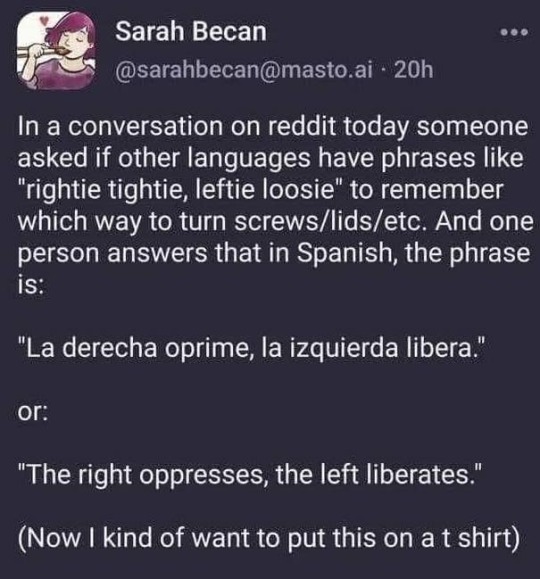Text
do people even know the extent of sanctions on the iranian people? my mom's family can't afford fruit anymore. it's a state of psychological warfare; literally nobody living there has any sort of hope for the future. added sanctions from the EU are going to destroy the lives of 87 million innocent people
17K notes
·
View notes
Text
the humble "like" is oft mocked despite what it does for us. "like, three people" is a vastly different statement from "three people". "and i was like 'what the fuck'" is vastly different from "and i said 'what the fuck'". i love you "like" and anyone who says you make people sound stupid will be killed on sight
50K notes
·
View notes
Text
Huge fan of when my speech patterns rub off on people enjoy when thay happens
124K notes
·
View notes
Text
Them: omg Sir Gawain and the Green Knight is a Masterwork of literature!
Me, crying: I dO nOT spEAk thIs laNGUaGe😭😭😭
i miss the days before i was enrolled in a medieval literature class <3
#medieval English#bruh a translation PLS#you wouldn’t hand me a book in German (which I don’t speak)#so pls don’t hand me a book that’s *technically* my language but so old that the intelligibility is at like 25% 😭
5 notes
·
View notes
Text
the name "theresa" is so funny like. theres a what
101K notes
·
View notes
Text
It’s very kind of people I speak other languages with to assume that my slow comprehension and endless requests for repetition are as a result of us not speaking my first language, when in reality, my auditory processing is just complete shit.
#linguistics#second language problems#I mean it’s definitely harder in my non-native languages to understand what people are saying#but it’s not fucking easy in my L1 either lmao#people are confused because I can see them thinking#‘oh they speak so well so surely they’re very proficient’#‘and yet they don’t understand what I’m saying?’#auditory processing disorder#auditory processing issues#adhd#neurodivergent#your local autistic linguist here!#*stares blankly at someone else speaking as I try to make my brain translate their mouth sounds into words*#I’m an English teacher and sometimes my students are like ‘my goal is to watch English shows without subtitles!’#and I’m like ‘babe *I* can’t even do that and it’s my native language’ XD
52 notes
·
View notes
Text
this is problematic of me (joke) but i really enjoy the splashing of french into english speech or writing. just adds a pizzazz
41K notes
·
View notes
Note
...you do know nobody is seriously going to use er/ihm/sein for you right? at this point you're just making a mockery of actual trans struggles.
er/ihm/sein is german for he/him/his dumbass
35K notes
·
View notes
Text
@doppelbangin a correct (and very funny)! Meme. I should have made it clear in the Og post that most slang originated from AAVE. Some of it developed from there, but speakers of AAVE continue to be the greatest contributors to “youth slang” as I (somewhat insensitively) described it. Some of it is appropriated, and it isn’t right how black people are mistreated for using their own language while wider culture appropriates it.
Thank you for adding this funny meme and pointing out what I should have included in the original post. I’ve updated my tags accordingly. ☺️
Studying linguistics is actually so wonderful because when you explain youth slang to older professors, instead of complaining about how "your generation can't speak right/ you're butchering the language" they light up and go “really? That’s so wonderful! What an innovative construction! Isn't language wonderful?"
21K notes
·
View notes
Text
Current linguistics obsession: the difference in English between “few/little” and “a few/a little”
“He convinced few people” Negative connotation; he did not convince that many people.
“He convinced a few people” Neutral to positive connotation; he did manage to convince some people.
“They found a little food” “Neutral to positive connotation; it might not be a lot, but they did manage to find some food.
“They found little food” Negative connotation; that’s not going to be enough food.
31K notes
·
View notes
Text
Hi! Wanted to clarify after seeing some of the notes-
I’m well aware that much of, if not most, modern gen z slang comes from aave. This was meant to be a silly little post that came about after a professor heard me discussing the potential conjugations of “yeet” (a word invented by a black Viner) and whether the past tense is “yeeted” or “yote” and actually got excited and interested instead of just scoffing and telling me that it wasn’t a real word. It was wrong of me not to put that obligatory note in the tags that, yes, most modern gen z slang originated in black communities by people using aave. I’ll be sure to correct those tags and apologize for my insensitivity.
Studying linguistics is actually so wonderful because when you explain youth slang to older professors, instead of complaining about how "your generation can't speak right/ you're butchering the language" they light up and go “really? That’s so wonderful! What an innovative construction! Isn't language wonderful?"
21K notes
·
View notes
Text
It's still kinda wild how Phineas and Ferb managed to completely hijack an idiom. Now whenever someone hears a sentence leading with "If I had a nickel for everytime [...]", odds are their brain auto fills with "I'd have two nickels. Which isn't a lot, but it's weird that it happened twice," rather than "I'd be rich," or "I could [action that requires purchasing something requiring an obscene amount of money]". Y'know, what the idiom originally was
98K notes
·
View notes
Text
Okay, so:
Latin has this word, sic. Or, if we want to be more diacritically accurate, sīc. That shows that the i is long, so it’s pronounced like “seek” and not like “sick.”
You might recognize this word from Latin sayings like “sic semper tyrannis” or “sic transit gloria mundi.” You might recognize it as what you put in parentheses when you want to be pass-agg about someone’s mistakes when you’re quoting them: “Then he texted me, ‘I want to touch you’re (sic) butt.’”
It means, “thus,” which sounds pretty hoity-toity in this modren era, so maybe think of it as meaning “in this way,” or “just like that.” As in, “just like that, to all tyrants, forever,” an allegedly cool thing to say after shooting a President and leaping off a balcony and shattering your leg. “Everyone should do it this way.”
Anyway, Classical Latin somewhat lacked an affirmative particle, though you might see the word ita, a synonym of sic, used in that way. By Medieval Times, however, sic was holding down this role. Which is to say, it came to mean yes.
Ego: Num edisti totam pitam?
Tu, pudendus: Sic.
Me: Did you eat all the pizza?
You, shameful: That’s the way it is./Yes.
This was pretty well established by the time Latin evolved into its various bastard children, the Romance languages, and you can see this by the words for yes in these languages.
In Spanish, Italian, Asturian, Catalan, Corsican, Galician, Friulian, and others, you say si for yes. In Portugese, you say sim. In French, you say si to mean yes when you’re contradicting a negative assertion (”You don’t like donkey sausage like all of us, the inhabitants of France, eat all the time?” “Yes, I do!”). In Romanian, you say da, but that’s because they’re on some Slavic shit. P.S. there are possibly more Romance languages than you’re aware of.
But:
There was still influence in some areas by the conquered Gaulish tribes on the language of their conquerors. We don’t really have anything of Gaulish language left, but we can reverse engineer some things from their descendants. You see, the Celts that we think of now as the people of the British Isles were Gaulish, originally (in the sense that anyone’s originally from anywhere, I guess) from central and western Europe. So we can look at, for example, Old Irish, where they said tó to mean yes, or Welsh, where they say do to mean yes or indeed, and we can see that they derive from the Proto-Indo-European (the big mother language at whose teat very many languages both modern and ancient did suckle) word *tod, meaning “this” or “that.” (The asterisk indicates that this is a reconstructed word and we don’t know exactly what it would have been but we have a pretty damn good idea.)
So if you were fucking Ambiorix or whoever and Quintus Titurius Sabinus was like, “Yo, did you eat all the pizza?” you would do that Drake smile and point thing under your big beefy Gaulish mustache and say, “This.” Then you would have him surrounded and killed.
Apparently Latin(ish) speakers in the area thought this was a very dope way of expressing themselves. “Why should I say ‘in that way’ like those idiots in Italy and Spain when I could say ‘this’ like all these cool mustache boys in Gaul?” So they started copying the expression, but in their own language. (That’s called a calque, by the way. When you borrow an expression from another language but translate it into your own. If you care about that kind of shit.)
The Latin word for “this” is “hoc,” so a bunch of people started saying “hoc” to mean yes. In the southern parts of what was once Gaul, “hoc” makes the relatively minor adjustment to òc, while in the more northerly areas they think, “Hmm, just saying ‘this’ isn’t cool enough. What if we said ‘this that’ to mean ‘yes.’” (This is not exactly what happened but it is basically what happened, please just fucking roll with it, this shit is long enough already.)
So they combined hoc with ille, which means “that” (but also comes to just mean “he”: compare Spanish el, Italian il, French le, and so on) to make o-il, which becomes oïl. This difference between the north and south (i.e. saying oc or oil) comes to be so emblematic of the differences between the two languages/dialects that the languages from the north are called langues d’oil and the ones from the south are called langues d’oc. In fact, the latter language is now officially called “Occitan,” which is a made-up word (to a slightly greater degree than that to which all words are made-up words) that basically means “Oc-ish.” They speak Occitan in southern France and Catalonia and Monaco and some other places.
The oil languages include a pretty beefy number of languages and dialects with some pretty amazing names like Walloon, and also one with a much more basic name: French. Perhaps you’ve heard of it, n'est-ce pas?
Yeah, eventually Francophones drop the -l from oil and start saying it as oui. If you’ve ever wondered why French yes is different from other Romance yeses, well, now you know.
I guess what I’m getting at is that when you reblog a post you like and tag it with “this,” or affirm a thing a friend said by nodding and saying “Yeah, that”: you’re not new
#to anyone getting annoyed with people who reblog or make comments with ‘this’#it is merely human instinct#so like#maybe fuck off and stop being so high n mighty
40K notes
·
View notes



